Alena Alamgir (University of Exeter; Universität Leipzig), “They knit sweaters and refuse to follow the foreman’s instructions”: Collective protests of Vietnamese workers in Czechoslovakia in the 1980s
In the spring of 1983, a twelve-day strike broke out in Czechoslovakia, organized by a group of Vietnamese workers in one of the agricultural plants. This strike revealed some significant differences between the Vietnamese and their Czechoslovak “hosts” in underst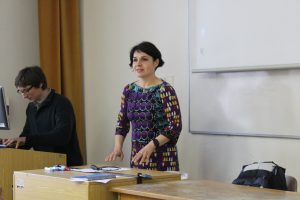 anding terms such as “work ethic” or “socialist internationalism.” It pointed out that there were considerable contradictions between the Czechoslovak and Vietnamese conceptions of socialism. In addition, this event may also provide us a valuable insight into the lives of Vietnamese workers in Czechoslovakia in the 1980s and tell a lot about the nature and reality of Czechoslovak late socialism. So far the topic of labor migration between the former socialist states before 1990 has been one of the neglected topics in historical research. The few works that have been created on this subject mostly ignore the important fact that foreign workers have often pointed out on the non-observance of their labor rights and also, in the contemporary context of the host country, have unusually openly defended them. This lecture was focused on this aspect through the analysis of sources such as police files or oral testimony of witnesses. The structural features of the Vietnam-Czechoslovak “labor exchange” program behind this defiance was not overlooked either.
anding terms such as “work ethic” or “socialist internationalism.” It pointed out that there were considerable contradictions between the Czechoslovak and Vietnamese conceptions of socialism. In addition, this event may also provide us a valuable insight into the lives of Vietnamese workers in Czechoslovakia in the 1980s and tell a lot about the nature and reality of Czechoslovak late socialism. So far the topic of labor migration between the former socialist states before 1990 has been one of the neglected topics in historical research. The few works that have been created on this subject mostly ignore the important fact that foreign workers have often pointed out on the non-observance of their labor rights and also, in the contemporary context of the host country, have unusually openly defended them. This lecture was focused on this aspect through the analysis of sources such as police files or oral testimony of witnesses. The structural features of the Vietnam-Czechoslovak “labor exchange” program behind this defiance was not overlooked either.
Frank Gerits (Utrecht University), „JFK’s and LBJ’s Efforts to Transform the Anticolonial Project in Africa (1960–1966)“
President John F. Kennedy is often cast as a supporter of African nationalism. In the most recent books, Kennedy and his aides emerge as people who were perceptive enough to distinguish communism from nationalism but lacked the sensitivity to acknowledge the adverse effects of the modernisation they promoted. 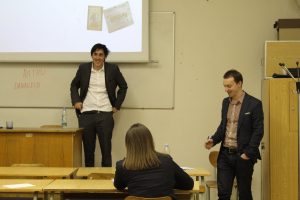 New research, however, reveals that Kennedy’s commitment to modernisation theory included a profound concern about psychological changes that would be unleashed by the modernization project itself. The United States Information Agency (USIA) therefore played an important role in managing the modernisation process. Not only Kennedy, but also LBJ saw anticolonial nationalism as first and foremost an emotional and psychological problem. The LBJ White House expanded upon Kennedy’s approach by committing to persuading Africans of the need for regional integration as a means to deal with the negative side effects of nationalism and modernization.
New research, however, reveals that Kennedy’s commitment to modernisation theory included a profound concern about psychological changes that would be unleashed by the modernization project itself. The United States Information Agency (USIA) therefore played an important role in managing the modernisation process. Not only Kennedy, but also LBJ saw anticolonial nationalism as first and foremost an emotional and psychological problem. The LBJ White House expanded upon Kennedy’s approach by committing to persuading Africans of the need for regional integration as a means to deal with the negative side effects of nationalism and modernization.
Natalia Telepneva (University of Warwick), „Czechoslovakia and the End of Portuguese Empire in Africa, 1961–1975“
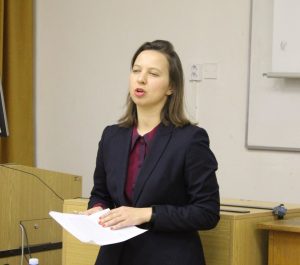
This lecture focuses on the role of Czechoslovakia during the anti-colonial campaigns in Portuguese Africa – Angola, Mozambique and Guinea-Bissau – between 1961 and 1975.
Natalia Telepneva explains why Czechoslovakia became the first country to support the anti-colonial movements in Portuguese Africa in 1961, the role of secret intelligence, relations with the Soviet Union, and the consequences of 1968 for Czechoslovak international engagement. Telepneva’s talk will also emphasise the role of Czechoslovak agency in the Cold War in Africa.
Wendy Z. Goldman (Carnegie Mellon University), „Starvation, Rationing, and Black Markets in the Soviet Union During World War II
How did the Soviet people survive the war? After the Nazi invasion, the Soviet state quickly established a hierarchical rationing system to ensure food to the population. Yet the loss of the occupied territories created severe shortages. By 1942, people had begun to starve. Even industrial workers, who received the highest rations, were living on a single bowl of cabbage soup a day. Food shortage prompted the growth of black markets and theft, from petty pilfering to large scale embezzlement. Some officials siphoned food from workers to create new hierarchies to benefit themselves. Others redistributed food to help more poorly-provisioned groups like orphans and white collar workrs. The ration system, which ultimately proved successful, was established by the state and remade in practice in a constant struggle over food.
Giles Scott-Smith (Leiden University), “Looking for Lagonia: On ‘Imaginary Bridges’ and Cold War Boundaries”
On 28 May 1987 the West German teenager Matthias Rust took off in his single-engined Cessna from Helsinki’s Malmi airport and headed out over the Gulf of Finland.  Within half an hour he changed course, heading instead for the Estonian coast. Several hours later he landed his plane on Red Square, the centre of Moscow. His escapade caused a sensation and had major political ramifications in the Soviet Union. This lecture looks at Rust’s background, his motivation, and how we might interpret its meaning within Europe’s experience of the Cold War.
Within half an hour he changed course, heading instead for the Estonian coast. Several hours later he landed his plane on Red Square, the centre of Moscow. His escapade caused a sensation and had major political ramifications in the Soviet Union. This lecture looks at Rust’s background, his motivation, and how we might interpret its meaning within Europe’s experience of the Cold War.
Giles Scott-Smith (Leiden University)
Seminář na téma: Cold War Cultural Lines: The Congress for Cultural Freedom, the Obor Foundation, and the Campaign to Create a Liberal Public Sphere in SE Asia
The seminar will cover the campaign of the Congress for Cultural Free- dom (CCF) to establish a global liberal intellectual community as part of the Cold War contest of ideas with the communist world. A central part of this campaign were the many journals set up or supported by the CCF around the world, some of which still exist today. The semi- nar will discuss the research on those journals from the recent book, Campaigning Culture and the Global Cold War, and then look in detail at one of the most interesting developments that came out of the CCF campaign – the Obor Foundation of Ivan Katz, and the attempt to pursue the CCF agenda by other means in SE Asia from the 1970s onwards.
Daniela Richterová (Brunel University London), “Terrorist Carlos the Jackal in Prague – A Big Challenge for the Czechoslovak State Security (StB)”
Relations between intelligence services and international terrorists belong among the most classified state secrets, in democratic states as well as in authoritarian ones. For decades, the relation between socialist Czechoslovakia and one of the most wanted terrorist Ilich Ramirez Sanchez so-called Carlos the Jackal, was one of these secrets. Documents from Czechoslovak archives show us more about Jackals stays in Czechoslovakia. It was a dynamic relation full of paradoxes and changes. In years 1978–1986 The Jackal and his companions visited Prague several times. Regardless whether it was a holiday or business meeting Czechoslovak State Security (StB) monitored their steps. At 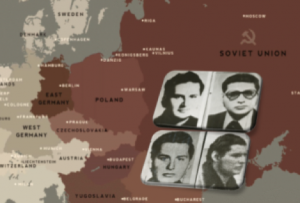 the beginning StB just tracked and watched the Jackal, afterwards when the Venezuelan terrorist became more famous, they decided to not allowed him to enter into Czechoslovakia. This lecture brings discussion about this change of approach and also reveals problems StB had to face during the tracking of the Jackal. The goal of this lecture is to contest the late Cold War theory which says that the Moscow and other Eastern Bloc states supported international terrorism against the West.
the beginning StB just tracked and watched the Jackal, afterwards when the Venezuelan terrorist became more famous, they decided to not allowed him to enter into Czechoslovakia. This lecture brings discussion about this change of approach and also reveals problems StB had to face during the tracking of the Jackal. The goal of this lecture is to contest the late Cold War theory which says that the Moscow and other Eastern Bloc states supported international terrorism against the West.
Paschalis Pechlivanis (Utrecht University), “The United States, Eastern Europe and the policy of differentiation from Nixon to Carter.”
Cold War historiography has long neglected American foreign policy towards Eastern Europe. A significant factor for this historiographical oversight is that Eastern Europe was overshadowed by its hegemonic patron, the Soviet Union. 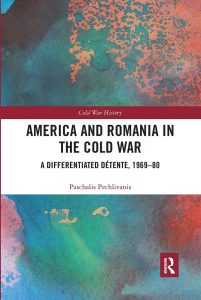 Hence, also due to the ‘bloc’ or ‘satellite’ perception of the socialist world by the West, US considerations regarding Eastern European regimes appear only in passing in most landmark historical treatises of US foreign policy, which inevitably focus on the struggle of both superpowers for the hearts and souls of mankind. The aim of this talk is to discuss a certain aspect of American foreign policy in Eastern Europe, namely the policy of ‘differentiation’ as it was implemented by the administrations of Nixon, Ford and Carter, respectively. In this light, the lecture will explore whether US foreign policy during the Cold War was more nuanced than the common East vs. West narrative suggests.
Hence, also due to the ‘bloc’ or ‘satellite’ perception of the socialist world by the West, US considerations regarding Eastern European regimes appear only in passing in most landmark historical treatises of US foreign policy, which inevitably focus on the struggle of both superpowers for the hearts and souls of mankind. The aim of this talk is to discuss a certain aspect of American foreign policy in Eastern Europe, namely the policy of ‘differentiation’ as it was implemented by the administrations of Nixon, Ford and Carter, respectively. In this light, the lecture will explore whether US foreign policy during the Cold War was more nuanced than the common East vs. West narrative suggests.
Ala Al-Hamarneh (Orient-Institut Beirut), „Global South“ Students in the Eastern Bloc during the Cold War – from Geopolitics to History“
Discussing and analyzing the impacts of the “Cold War” in/from a Third World/Global South perspectives is rather a new approach in humanities and social sciences, but especially in history, political sciences, development studies and political geography. Theorizing the global south within the cold war includes new approaches and new interpretations of existing concepts such as “decolonization”, “anti-colonialism”, “neo-colonialism”, “dependency”, “nation building”, “hegemony”, “global systems theory”, “security”, “development”, “modernization”, “globalization”, “capital accumulation” etc. The lecture aims to outline the main conceptual approaches of studying the cold war/global south nexus by exemplifying the case of former students from the Arab countries in the Eastern Bloc countries.